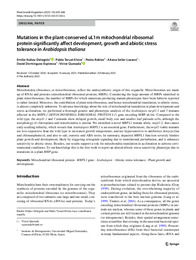Título :
Mutations in the plant‑conserved uL1m mitochondrial ribosomal
protein significantly affect development, growth and abiotic stress
tolerance in Arabidopsis thaliana |
Autor :
Núñez‑Delegido, Emilio
Teruel‑Elvira, Pablo
Robles, Pedro
Seller‑Lozano, Aitana
Domínguez‑Espinosa, David
Quesada, Víctor |
Editor :
Springer |
Departamento:
Departamentos de la UMH::Biología Aplicada |
Fecha de publicación:
2025-02 |
URI :
https://hdl.handle.net/11000/38362 |
Resumen :
Mitochondria ribosomes, or mitoribosomes, reflect the endosymbiotic origin of this organelle. Mitoribosomes are made
up of RNAs and proteins (mitochondrial ribosomal proteins, MRPs). Considering the large amount of MRPs identified in
plant mitoribosomes, the number of MRPs for which mutations producing mutant phenotypes have been hitherto reported
is rather limited. Moreover, the contribution of plant mitoribosomes, and hence mitochondrial translation, to abiotic stress,
is almost completely unknown. To advance knowledge about the role of mitochondrial translation in plant development and
stress acclimation, we performed a thorough genetic and phenotypic analysis of the Arabidopsis mrpl1-1 and 3 mutants
affected in the MRPL1 (MITOCHONDRIAL RIBOSOMAL PROTEIN L1) gene encoding MRP uL1m. Compared to the
wild type, the mrpl1-1 and 3 mutants show delayed growth, small body size and smaller leaf palisade cells, although the
morphology of chloroplasts and mitochondria is similar. We identified a novel MRPL1 mutant allele, mrpl1-2, that causes
early seedling lethality, which reveals that Arabidopsis MRPL1 is an essential gene. Furthermore, the mrpl1 viable mutants
are less responsive than the wild type to increased growth temperature, and are hypersensitive to antibiotics doxycycline
and chloramphenicol, and also to salt, osmotic and ABA stress. In summary, impaired MRPL1 function severely hinders
plant growth and development, likely by triggering retrograde signaling due to translational perturbation, and it enhances
sensitivity to abiotic stress. Besides, our results support a role for mitochondria translation in acclimation to adverse environmental
conditions. To our knowledge this is the first work to report an altered abiotic stress sensitivity phenotype due to
mutations in a plant MRP gene.
|
Palabras clave/Materias:
Mitochondrial ribosomal protein
MRPL1 gene
Arabidopsis
Abiotic stress tolerance
Plant growth and development |
Área de conocimiento :
CDU: Ciencias puras y naturales: Biología: Biología celular y subcelular. Citología |
Tipo de documento :
info:eu-repo/semantics/article |
Derechos de acceso:
info:eu-repo/semantics/openAccess
Attribution-NonCommercial-NoDerivatives 4.0 Internacional |
DOI :
https://doi.org/10.1007/s10725-025-01282-x |
Publicado en:
Plant Growth Regulation, 2025) 105:429–448 |
Aparece en las colecciones:
Artículos - Biología Aplicada
|
 La licencia se describe como: Atribución-NonComercial-NoDerivada 4.0 Internacional.
La licencia se describe como: Atribución-NonComercial-NoDerivada 4.0 Internacional.
.png)
